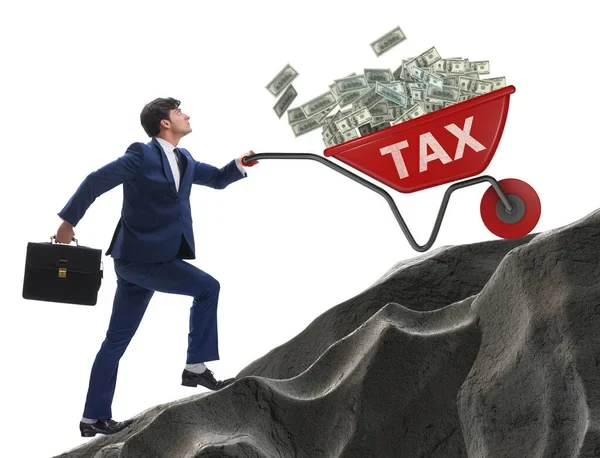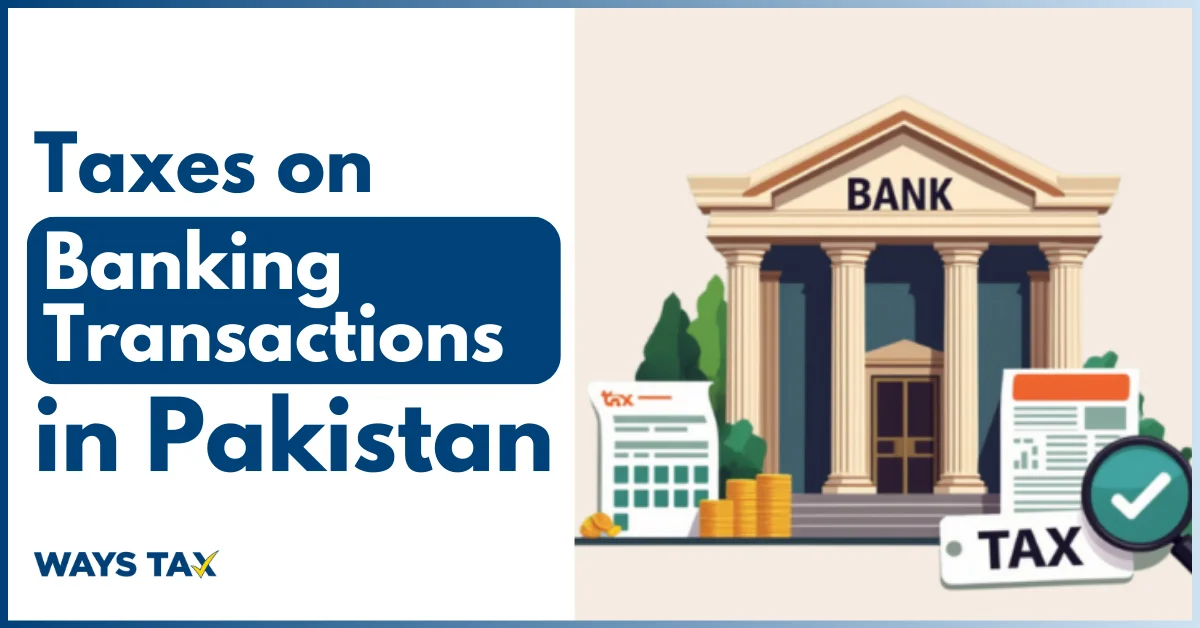Taxes on Banking Transactions in Pakistan (2026)
In Pakistan, whenever you do banking transactions, the government charges tax. These taxes help the government keep track of money movement and make sure more people pay their fair share of income tax.
If you are a filer (you submit your income tax returns), you pay less tax.
If you are a non-filer (you do not submit your returns), you pay more tax and also face extra restrictions.
So, in this guide, I will tell you in detail about the taxes on banking transactions in Pakistan in 2026 including filer & Non filer tax on bank transactions in Pakistan.
Want to Pay Less Banking Tax? Become a Filer Today!
Don’t let high tax rates and restrictions eat into your hard-earned money. At WaysTax.com, we make tax filing simple, fast, and affordable.

Taxes on Banking Transactions in Pakistan in Different Scenarios
Let’s discuss different scenarios in which you pay tax on bank transactions in Pakistan 2026
1. Tax on Cash Withdrawals
When you take more than PKR 50,000 in cash from your bank in one day, you must pay tax on the extra amount.
- Cash withdrawal tax for filer in Pakistan: 0.3% tax on the extra amount above PKR 50,000.
- Non-Filers: pay 0.6% tax.
The rate for non-filers may go up to 0.8% or more in the future to push them to become filers.
Example:
If you are a non-filer and withdraw PKR 100,000 in a day, you will pay 0.6% tax on PKR 50,000 (because the first PKR 50,000 is exempt). That means PKR 300 will be cut automatically.
Banks have also increased other charges like ATM card fees, SMS alert charges, and fees for using other banks’ ATMs. This means your overall banking cost is higher now.
2. Tax on Debit/Credit Card Payments Abroad
When you use your debit card, credit card, or prepaid card for payments outside Pakistan (for example, shopping on an international website or booking a hotel abroad), the bank cuts tax from your payment.
- Filers: 5% tax.
- Non-Filers: 10% tax.
This is under Section 236Y of the Income Tax Ordinance and is deducted automatically by the bank.
3. Tax on Bank Profits (Interest)
If you earn profit from your savings account, fixed deposits, or bonds, the bank deducts tax before giving you the money.
- Filers: 20% tax.
- Non-Filers: 40% tax.
This tax is considered an advance payment towards your annual income tax.
What is “Profit on Debt”
“Profit on debt” means the income you earn on your savings, deposits, or investments. This can be:
- Interest/profit from bank accounts or fixed deposits.
- Profit from National Savings Schemes (Post Office, Behbood, Defence Certificates).
- Returns on Islamic bonds (Sukuks).
- Interest on corporate bonds or debentures.
Example: If you earn profit from a savings account, that is “profit on debt” and it will be taxed.
Who Pays This Tax?

The bank or financial institution usually deducts this tax before paying you (this is called withholding tax).
Special case:
Profit from Behbood Savings Certificates does not have tax deducted at source. You will pay the 5% tax yourself when filing your income tax return.
Relief on Delayed Payments (Lower Tax Option)
If you receive profit late (for example, from older years when tax rates were lower), you can request the FBR Commissioner to apply the old rate. This can save you money and prevent you from moving into a higher tax bracket.
Tax Rates on Bank Profits: 2025–26
These rates apply from July 1, 2025, to June 30, 2026:
| Category | Profit ≤ PKR 5 Million | Profit > PKR 5 Million |
| Filers / Active Taxpayers | 20% | Normal income slab rates (up to 45%) |
| Non-Filers / Inactive | 40% | Normal income slab rates (up to 45%) |
| Non-Residents (with certificate) | Exempt | Exempt |
- For individuals and AOPs, the tax deducted at source is final.
- For companies, it’s adjustable against the final tax bill.
Zakat Deduction
Banks may also deduct 2.5% Zakat from your profit before applying withholding tax, if you are eligible.
Defense Saving Certificates (DSC) Tax Rates
- Filers: 15% withholding tax on DSC profits.
- Non-Filers: 35% withholding tax on DSC profits.
Government Monitoring of Big Transactions
The government closely monitors accounts if:
- You withdraw more than PKR 3.5 million in a year.
- You deposit more than PKR 28 million in a year.
If you are a non-filer, you can face:
- Bank account freeze.
- Ban on buying property or vehicles.
- Ban on investing until you file your tax returns.
The government shares your tax return details with banks to ensure your account activity matches your declared income.
Tax-Free Banking Transactions
Some transactions are generally not taxed, such as:
- Online money transfers within Pakistan.
- Money coming from abroad (inward remittances).
Why Does Tax on Banking Transactions in Pakistan Exist?
The main goals of these taxes are to:
- Increase documentation of money flow.
- Make more people file their taxes.
- Keep the economy transparent.
If you are a filer, you save money and avoid most restrictions.
How to calculate taxes on banking transactions in Pakistan
Let WaysTax.com calculate them for you. Get accurate figures, save money, and file stress-free today!

Wrapping Up: Tax on Banking Transactions in Pakistan
In 2025, banking taxes in Pakistan mainly focus on:
- Cash withdrawals above PKR 50,000 in a day.
- International card payments.
- Bank profits (interest).
- Non-filers pay much higher rates and face many restrictions.
- Filers save money and avoid bans on property, vehicles, and investments.
In a nutshell ,there are huge advantage of becoming a filer in Pakistan
Reference
https://tribune.com.pk/story/2554111/govt-starts-taxing-all-bank-transactions

